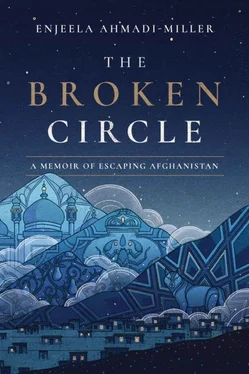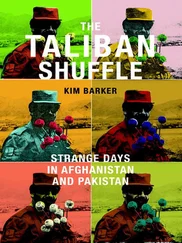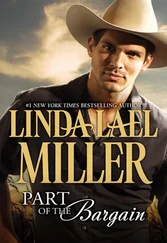“Yes, Colonel.” The guard stood aside to let us through. Padar stationed himself across from him, and we passed between the two men, who never ceased eyeing each other.
Before Padar passed through, the colonel spoke, his dark eyes set on us. “You will return for the flight, Mr. Ahmadi, inshallah.”
“Yes, Colonel, inshallah.”
After Padar stepped a few feet beyond the customs booth, he turned back, held his hand over his heart, and said, “As-salaam alaikum.”
“Wa alaikum as-salaam.” The police colonel pivoted briskly and headed back up the concourse. We hustled out the glass doors into the golden sunlight. The morning air smelled of exhaust from the idling taxis and buses, with a noticeable tinge of freedom around the fringes of the cool air.
The Baitul Mukarram mosque was a white slab of marble that rose prominently from the earth and shimmered in the morning light. It was one of the largest mosques in the world, and it sat in the middle of a teeming Dhaka. Padar explained that it was constructed as a cube to mimic the famous Kaaba in Mecca. As our taxi from the airport wended its way through the dense traffic of exhaust-spewing trucks, endless cars, rickshaws, and numerous oxen carts, the white cube continued to rise above all of the other buildings and loomed dominant in the sky as the taxi drove up to the massive east entrance. It was one of the most beautiful mosques I’d ever seen.
My sisters and I retrieved our chadors from our backpacks and covered ourselves. The driver stopped far down the curb where a space opened up, and we climbed out. Padar paid the fare, and we all lugged our suitcases up the walkway. A wide marble courtyard sprawled out from the entry arches and led to the interior prayer spaces.
We were soon enveloped in a crowd heading into prayer. Men and women mostly wore shalwar kameez and all the women wore chadors, even the children. The cube itself was nine or ten stories high, and the entrance arches were halfway up the face of the stone edifice. An attendant pointed to where we could leave our luggage. The women streamed to one side, the men to the other.
“Meet me right back here at the pillar by your luggage when prayers are over,” he said, pointing out the spot. “Don’t leave the mosque without me.” He stared right at me. I promised him I wouldn’t. “It doesn’t matter how long you have to wait for me, don’t move. We’re safe inside here. No one will bother us. Not even the police. Do you understand?” We all answered yes. He let us go, and my sisters and I headed off with the other women to pray.
We spread our prayer mats behind rows of women reciting their prayers. I knew mine by heart and went through them quickly. As I prayed, I remembered a Hafiz poem Padar always recited.
Pray
Somewhere in this world—
Something good will happen.
I recited this poem in my head all the way through the service. Soon women rose to their feet and began rolling up their prayer mats to leave. Working our way through the stiff crowd, holding hands, we found the pillar, where we waited for Zia and Padar.
Worshippers poured through the exits to the east, the north, and the south. Padar and Zia emerged, and we followed Padar out onto the large marble veranda that swept around the building. People lounged around in groups, talking and waiting. He led us to gardens made of wide lawns and roses and bushes of every kind, meticulously trimmed and maintained. We strolled along the paths until we found a stone bench by a fountain, where I sat with my sisters. Zia and Padar sat cross-legged on the grass in front of the pool of water at the fountain’s edge, and we ate the snacks we’d stowed in our backpacks the night before. The trilling water hitting the stone soothed us. I felt myself unwind a bit. The tranquility of the moment belied the agony I had felt just hours before.
“The colonel wanted us to return, didn’t he?” I asked.
“Yes, he did,” Padar said. We all looked up as a knowing smile crept across his face. “Inshallah—if Allah wills it. God often puts these choices before us. I don’t believe for a moment that it is the will of Allah we return to Kabul to be handed over to godless murderers.”
“If we change our mind, we change our life,” I said, repeating something that he had recited to us many times.
“Bravo, my little poet,” he said, smiling at me.
The only sound in the garden was a gurgle that I could have sworn turned into laughter that spread across the entire area. The air suddenly became light and sweet-smelling.
“If you look for love and hope in this world, you will find it. Look around you. Look where we have ended up.” He spread his hands out wide to indicate that we should take in the breadth of the garden, as if this ordeal was all part of some grand scheme designed so we could witness this patch of serene beauty. Always a silver lining in Allah’s mysterious ways. That same hand that slaps down some, blesses others.
“Are you aware that gardens such as these are constructed in a certain pattern?”
“Like a poem,” Laila said.
He nodded. “In a way. These gardens are said to resemble the pattern of heaven.”
I took in the plants and trees and lawns with a more scrutinizing gaze. I didn’t see any pattern that told me anything I could identify specifically as heaven, except the flowers smelled fresh, birds sang in the peaceful surroundings, and it was quiet and safe. If quiet and peace and a sense of safety was heaven, then this place resembled it in that familiar way. But it was Padar who had figured out how to get us here.
We rested there talking for a long while until he led us through the gardens, pointing out the different plants and trees, strolling by the many fountains that dotted the green lawns. Before long, the muezzin’s call to prayer rang out over the grounds. We returned for afternoon prayers and then met up again at the same pillar.
“Do you think the police are looking for us?” Laila asked.
Padar shook his head. “I don’t think they care to, really.”
“I’m hungry,” Laila said. We all agreed it was time for a regular meal. Padar led us out to the veranda again to an elevator. As it went below the mosque, the doors opened up into a shopping mall. We were barely out of the elevator when we were hit with the strong aroma of curry. We found a restaurant and feasted on fish curry with eggplant and apple; and spicy chicken, black rice, and fried vegetables; and khejur gur , a sweet dessert made from date-palm sugar. After eating, we all sat back and let out a sigh of pleasure. We strolled the underground mall full of shops selling every type of clothing, cookware, electronics, bicycles, jewelry, and more. It made me homesick, but in a pleasant way. In some imperceptible way, we were journeying closer to what we all wanted, and here were shops full of reminders of good things to come.
The call to evening prayers was broadcast throughout the mall, and we followed the crowd upstairs to pray. Afterward we met Padar and Zia again near the same pillar, and this time Padar guided us toward the north exit, on the other side of the huge mosque. We mingled with the crowd flowing out of the mosque, and once near the curb outside, Padar hailed a taxi, and we all climbed in. No one had followed us. We were free to travel. Padar was right again that it was not Allah’s will we return to Kabul. Inshallah.
The driver took us across the city to a hotel, where we dragged our luggage into the lobby and waited while Padar checked us in. Upstairs, the three girls had our own room, and the men had an adjoining room.
In the hall by our doors, Padar handed over a key to Laila. “Let’s get cleaned up. I’ll order some food in about an hour.”
Читать дальше













